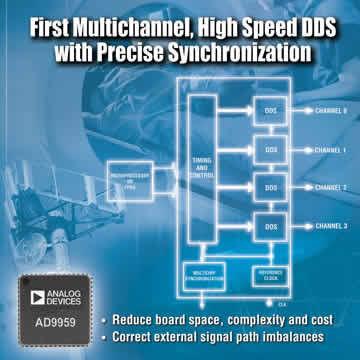Norwood, MA
- Analog Devices Inc. today announced the industry’s only multichannel DDS (direct digital
synthesis) devices, providing a solution to two common design challenges faced by system engineers in a range of
applications. Allowing independent programming of up to four inherently synchronized outputs, ADI’s new
four-channel AD9959 and two-channel AD9958 deliver greater control to correct imbalances between multiple signals,
enabling engineers to spend considerably less time and effort on this usually complex portion of the system design.
For space-constrained systems, the AD9958 and AD9959 simplify the design
process by integrating multiple DDS channels on a single chip, eliminating the need for several single-channel DDS
chips and external circuitry and offering dramatic board space reduction of up to 75 percent over traditional
solutions. Direct digital synthesis is a digital technique used for generating an analog output waveform or clocking
signal from a fixed-frequency clock source. The AD9959 and AD9958 are optimized for applications that require
complex high speed synthesis up to 200 MHz, including phased-array radar/sonar systems, automatic test equipment,
medical imaging and optical communications systems. “Analog Devices is meeting the synthesizer
synchronization challenge by leveraging its world-class converter technologies to develop highly-integrated DDS
devices that lower the cost and complexity of system design,” said Kevin Kattmann, product line director, high
speed converter group, Analog Devices. “The ability to easily achieve precision phase offset control between
multiple synchronized output channels, while consuming minimal board space, enables the AD9959 and AD9958 to offer
system designers significant advantages over traditional frequency synthesizer solutions and single-channel DDS
products.”
|  | |
DDS Technology
Used in a wide range of applications from test and measurement equipment to
wireless and satellite communications, ADI’s complete DDS solutions employ an on-chip high-performance DAC
(digital-to-analog converter) to convert a reference frequency to a sampled sine wave with extremely fine frequency
control. DDS devices are increasingly becoming an attractive alternative to traditional frequency-agile analog
synthesizer solutions as they offer considerable performance benefits, such as unparalleled matching of outputs,
easier synchronization for obtaining quadrature and other signal phase relationships, and extremely fast frequency
transition. Digital control eliminates the need for manual system tweaking and allows output frequencies to be
conveniently derived. Precise Synchronization, Low Power
In order to alleviate the design
complexities typically involved in the synchronization of multiple DDS devices, the independent channels of the
AD9959 and AD9958 are internally synchronized by a common reference clock. Programmable channel control allows for
correction of imbalances in external signal paths due to analog processing, such as filtering, amplification, or PCB
layout mismatches. If additional channels are required, the AD9959 and AD9958 allow daisy chaining of additional DDS
chips. The devices also offer extremely low power consumption of less than 165 mW per channel. Independent Channel Phase, Frequency, and Amplitude Control
Each channel of the four-channel AD9959
and the two-channel AD9958 incorporates a high speed 10-bit DAC with excellent wideband and narrowband SFDR
(spurious free dynamic range). Each fully independent programmable channel provides 14-bits of phase offset tuning,
32-bit frequency resolution and 10-bit amplitude control. The device also supports direct or linear sweep
modulation, while achieving channel isolation of greater than 60 dB. The integrated 32-bit frequency tuning word
enables each channel to be programmed to resolutions of 116 mHz or less with a sampling clock of up to 500 MSPS.
Pricing and Availability
The AD9959 is available in production quantities now; the
AD9958 is sampling now with product quantities available in September, 2005. Both devices are specified over the
extended industrial temperature range of –40 degrees C to +85 degrees C. The four-channel AD9959 and the
two-channel AD9958 are respectively priced at $37.14 and $20.24 per unit in 1,000-piece quantities and are each
packaged in an 8 mm × 8 mm LFCSP (lead frame chip scale package).
ADI’s Data
Conversion Technology: Critical Bridge Between Analog and Digital
Analog Devices is the world leader in
data conversion technology. ADI’s longstanding leadership in data conversion technology stems from an
engineering culture that emphasizes deep understanding of the customer’s system challenge, aggressive research
and development investing and unmatched mixed-signal design expertise. From application-specific solutions designed
to lower system cost to the broadest selection of speed, accuracy, size and power consumption in DACs and ADCs,
Analog Devices provides the products, technology and support customers need to successfully bridge between
real-world analog signals and the digital world of electronic equipment. ADI’s data converters are used widely
in consumer electronics, broadband and wireless communications, automotive systems, industrial equipment and medical
electronics, as well as a host of other emerging market applications. |








